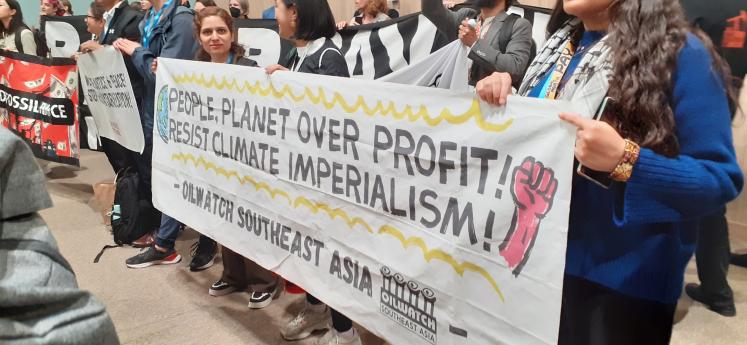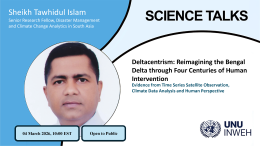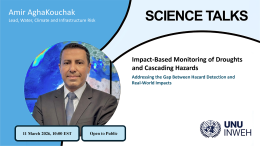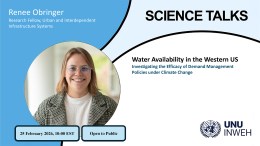Supercluster
I attended the Climate summit COP29 in Baku together with colleagues from the UNU Climate network. As the escalating impacts of the climate crisis on health and equity become more evident, there is a growing engagement with health actors in global climate policy and finance. This trend must be seen in perspective of a ‘planetary health equity (PHE) governance supercluster’. This network mapping suggests that International Organisations (IO’s) increasingly have to tackle issue areas adjacent to their core mandate. For instance, the response to climate change is now a strategic objective in the Global Programme of Work of the World Health Organization (WHO). In the PHE ‘supercluster complex’, climate, health, and economic governance structures and organisations all come together. I had to make sense of these clustered group of actors, issues and discourses during the COP29 sessions. This has been a considerable challenge also given UNU-IIGH’s value framework of climate justice and health equity.
The main objective of this climate summit concerned financing and commitments, with the aim of agreeing on a new quantified goal for climate finance. This follows the recommendation from the independent expert group on climate finance that external finance should invest US$1.3 trillion in energy shifts for emerging markets and developing countries (EMDCs) by 2035. The WMO State of the Climate report stresses the urgency for climate action, showing that 2024 is on track to be the warmest year on record. This all takes place in times of increasing geopolitical tensions, escalating armed conflicts (Ukraine, Palestine, Myanmar, Sudan and elsewhere), and political developments in the United States and Europe that provides uncertainty for future international climate actions. Welcome to the world of the polycrisis! Below I describe my three main takes on the summit and end with a reflection on what is needed for a just climate and health transformation.
Betrayal
The main outcome of the Baku Climate summit felt like a betrayal for poor countries. A representative of the least developed countries (LDCs) negotiating bloc said: ‘[We are] outraged and deeply hurt by the outcome of COP29. Once again, the country’s most responsible for the climate crisis have failed us.’ While a US$1.3 trillion climate finance target per year by 2035 was agreed, only US$ 300bn of that will come in the form LDCs are most in need of – grants and low-interest loans from high-income countries (HICs). The wording also means that even this commitment is interpretable as it can come from a wide variety of sources, whether public or private. The quality of the finance is as important as the quantity. Many EMDCs, including India, Bolivia, Cuba and Nigeria, reacted to the deal with outrage. Countries have been negotiating a financial agreement for 3 years, but HICs only put a concrete number on the table at the very last minute. This was justified based on difficult domestic political outlooks. Moreover, under pressure of Saudia-Arabia, wording in the agreement dealing with ‘the transition away from fossil fuels’ was rejected. Although important steps have been made regarding climate adaptation indicators, the governance of a Loss & Damage fund, as well as a rulebook for carbon trading mechanism, it seems that nobody is happy with this agreement, and that is an understatement.
Climate and health
The health nexus was of secondary importance during this summit. Finance for climate mitigation and adaptation is of course of huge importance for public health (equity) outcomes. However, how much of this should be directed towards the health sector is still undefined, as are the overall financial commitments from global health actors to address the climate crisis. Before the summit, The Global Climate and Health Alliance provided 9 policy recommendations for ambitious climate action to protect and promote the health of people and planet. The WHO has published a COP29 special report on climate and health, which makes the case that health concerns should motivate climate action. A High level roundtable on Climate and health was organized with the aim of ensuring continuity between the different climate summits and enhancing support for The Alliance for Transformative Action on Climate and Health. The Multilateral Development Banks have planned to make over €1.5 billion available through concessional loans and grants for public health and primary health care as part of a Health impact Investment Platform which is currently under development. How these different climate and health initiatives will materialize, and what their policy and governance mechanisms will be, remains unclear. While the WHO is preparing for a Global action plan on Climate and Health, its coherence with the actions by different initiatives needs attention.
Fit for purpose?
Ahead of the summit, a diverse group of experts under the auspices of the Club of Rome wrote a letter to the UN secretary General. The letter outlines the need for a fundamental overhaul of the COP process, shifting away from negotiation to implementation, to ensure an urgent energy and just transition. It includes several recommendations such as; strict eligibility criteria for the COP presidency hosting country (this year over 1750 fossil fuel lobbyists were granted access); smaller, more frequent, solution-driven COP meetings; improving implementation and accountability; ensuring robust mechanisms for tracking climate financing; amplify the voice of science in policymaking; recognizing the important links between ecological and social change processes, in the light of growing inequities, impoverishment and planetary instability; and enhancing equitable representation in COP processes as corporate interests now overrule voices of those defending public goods, human security and justice. Amnesty International has clarified this misrepresentation, stating that space at the climate summits for human rights defenders and civil society has shrunken, with several Azerbaijani activists absent and crackdowns on government critics having continued after COP29 ended. In conclusion, while the expert group reiterates the important role the UNFCCC has and will play(ed), it stresses on urgency and purpose, by transforming the climate COP so that it can take strategic, action-oriented, participatory and accountable decisions.
A just transformation for climate and health
Let’s return to the ‘PHE governance supercluster’. This perspective indicates that structural power within the climate, health, and economics regime is not evenly distributed and that policy solutions to address climate and health inequities will be channeled through a lens of economic rationalism which has dominated discourses in the trade, investment, and development regimes. Moreover, the structural distance between key economic organizations, like the IMF, from environmental and public health organizations may undermine the urgent needed incorporation of social and ecological goals into the development of macroeconomic policy. Demands for a fair international financial architecture, including proposals by the Global South, are only to a limited extent linked to the actual climate negotiations. Hence the frustration by EMDCs and Small- Island States about the outcome of the summit. The coloniality of power patterns continue through the international economic regimes. The climate and health communities must connect with these political-economy debates and reflect on its own political and normative standpoints as to avoid that IO’s like the WHO, Global Health Initiatives and the Development Banks will be pushed towards inequitable pathways – such as prioritizing market-based solutions.
This planetary health cluster perspective reminds me of a 2012 analysis of the global health governance regime, which similarly argues that a structuring logic of neoliberalism exacerbates economic and health inequalities and limits the range of likely responses to global health problems. I found that discussions on policy as well as alternatives to the current economic and development discourses structuring climate actions were missing at the climate summit. Fadhel Kaboub framed it as follows: ‘COP29 was not about climate, it was about an economic and geopolitical hierarchy that is not supposed to be disturbed’. For the climate regime to become just and transformative, alternative economic and development proposals such as ‘Just transition Africa,’ A ‘Post-Growth Deal for Europe,’ the ‘Bridgetown initiative 3.0,’ ‘The Care Economy’ and construction of a ‘New International Economic Order’ for the 21st century deserve serious scientific and political attention. The climate and health community needs to engage, and demonstrate solidarity, with these initiatives to enable real change.
___
This article was originally published by The Collective for the Political Determinants of Health. Read the original piece here: https://go.unu.edu/AIQPg





